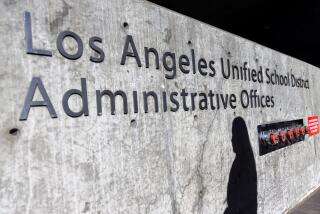The three Rs, and copyrights
- Share via
Joined by a number of top tech companies, the major Hollywood studios and music labels are hoping to enlist a powerful new ally in their fight against online piracy: grade schools. The companies are financing the development of a curriculum for grades K-12 that promotes respect for copyrights. Their interest is understandable, considering how piracy has exploded online and how early in life many kids start looking for free downloads. But it’s important that schools not sign on blindly to the agenda of a single industry, that the message be balanced, and that it’s just a small part of a broader lesson on how to use the Internet safely and responsibly.
To be fair, the proposal didn’t start with Hollywood. Instead, the idea came from the Internet Keep Safe Coalition, a nonprofit group that is developing the curriculum in consultation with the California School Library Assn. IKeepSafe took the idea to the Center for Copyright Information, an anti-piracy group backed by major entertainment companies, Internet service providers and technology advocates, and the center agreed to finance the project. The initial materials will be for kindergarten through sixth grade, although the plan is to extend it through 12th grade. It will be up to individual schools whether to incorporate it into their lesson plans.
Because the studios and labels are helping to pay for the curriculum, though, it smacks of corporate interests trying to persuade schools to promote their commercial agenda. That perception was underscored when Wired published an early draft of some of the materials, which focused only on the copyright holder’s rights, with no mention of the fair uses consumers can make. Leaders of iKeepSafe and the Center for Copyright Information insist that the final version will present the whole picture. That won’t be easy; these are complex legal issues that can be hard for teachers to understand, let alone convey to children. Besides, schools can’t spend a lot of time on such a narrow subject, given all the other things that must be taught. Copyright law, inevitably, will have to take a back seat to reading, writing and math.
To some degree, the issues surrounding copyrights and fair use online may be unavoidable for schools. Ever-younger children are plopping down in front of computers and other Internet-connected devices the way their parents planted themselves in front of the TV when they were growing up. And the Common Core standards embraced by numerous states (California included) require schools to teach students how to use the new technology to advance their education.
But the do’s and don’ts of copyrights are just one of many aspects of the issue of how students should use the Internet. There are abundant risks — including plagiarism, malware, lost privacy, predation and bullying — as well as important opportunities to learn, create and share. Any curriculum devoted to Internet use needs to cover all this ground, not just the lessons copyright owners want taught.
More to Read
A cure for the common opinion
Get thought-provoking perspectives with our weekly newsletter.
You may occasionally receive promotional content from the Los Angeles Times.










